Related Research Articles
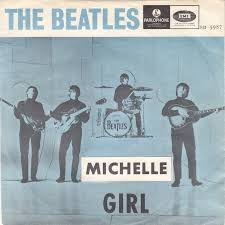
"Michelle" is a song by the English rock band the Beatles from their 1965 album Rubber Soul. It was composed principally by Paul McCartney, with the middle eight co-written with John Lennon. The song is a love ballad with part of its lyrics sung in French.

"Twist and Shout" is a 1961 song written by Phil Medley and Bert Berns. It was originally recorded by The Top Notes, but it did not become a hit in the record charts until it was reworked by the Isley Brothers in 1962. The song has been covered by several artists, including the Beatles, Salt-N-Pepa, and Chaka Demus & Pliers, who experienced chart success with their versions.

Pye Records was a British record label. Its best known artists were Lonnie Donegan (1956–1969), Petula Clark (1957–1971), the Searchers (1963–1967), the Kinks (1964–1971), Sandie Shaw (1964–1971), Status Quo (1968–1971) and Brotherhood of Man (1975–1979). The label changed its name to PRT Records in 1980, before being briefly reactivated as Pye Records in 2006.
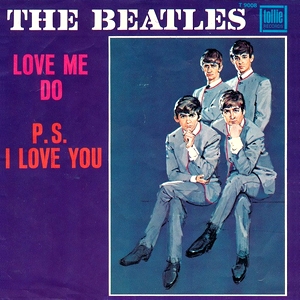
"Love Me Do" is the debut single by the English rock band the Beatles, backed by "P.S. I Love You". When the single was originally released in the United Kingdom on 5 October 1962, it peaked at number 17. It was released in the United States in 1964 and topped the nation's song chart. Re-released in 1982 as part of EMI's Beatles 20th anniversary, it re-entered the UK charts and peaked at number 4. "Love Me Do" also topped the charts in Australia and New Zealand.

John Dudley Leyton is an English actor and singer.
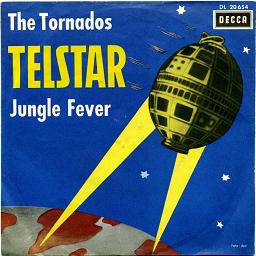
"Telstar" is a 1962 instrumental by the English band the Tornados, written and produced by Joe Meek. It reached number one on the UK Singles Chart and the US Billboard Hot 100 in December 1962. It was the second instrumental single to hit number one in 1962 on both the US and UK weekly charts.
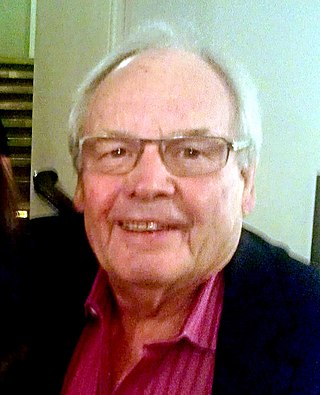
Anthony Peter Hatch is an English composer for musical theatre and television. He is also a songwriter, pianist, arranger and producer.
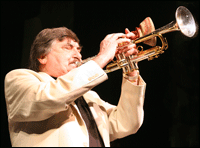
Kenneth Daniel Ball was an English jazz musician, best known as the bandleader, lead trumpet player and vocalist in Kenny Ball and his Jazzmen.

"Albatross" is a guitar-based instrumental by Fleetwood Mac, released as a single in November 1968, later featuring on the compilation albums The Pious Bird of Good Omen (UK) and English Rose (US). The piece was composed by Peter Green.

Daniel Joseph Anthony Meehan was a founder member of the British group the Drifters, with Jet Harris, Hank Marvin and Bruce Welch, which would evolve into the Shadows. He played drums on early Cliff Richard and the Shadows hits and on early Shadows instrumentals.

"Help!" is a song by the English rock band the Beatles that served as the title song for the 1965 film and its soundtrack. It was released as a single in July 1965, and was number one for three weeks in the United States and the United Kingdom.
Jackie Lee is an Irish popular music singer, who has recorded under various stage names.
"Heartaches by the Number" is a popular country song written by Harlan Howard, and published in 1959. The sheet music was a best seller in both the US and Britain in January 1960.

The Honeycombs were an English beat group, founded in 1963 in North London, best known for their chart-topping, million-selling 1964 hit, "Have I the Right?" The band featured Honey Lantree on drums, one of the few high-profile female drummers at that time. They were unable to replicate the success of their first single and disbanded by 1967.

"Ain't She Sweet" is a song composed by Milton Ager, with lyrics by Jack Yellen. It was published in 1927 by Ager, Yellen & Bornstein, Inc. It became popular in the first half of the 20th century and typified the Roaring Twenties. Like "Happy Days Are Here Again" (1929), it became a Tin Pan Alley standard. Both Ager and Yellen were elected to the Songwriters Hall of Fame.

"Have I the Right?" was the debut single and biggest hit of British band The Honeycombs. It was composed by Ken Howard and Alan Blaikley, who had made contact with The Honeycombs, a London-based group, then playing under the name of The Sheratons, in the Mildmay Tavern in the Balls Pond Road in Islington, where they played a date. Howard and Blaikley were impressed by the group's lead vocalist, Dennis D'Ell, and the fact that they had a female drummer, Anne (‘Honey’) Lantree. The group were looking for material to play for an audition with record producer Joe Meek, and they played the songs Howard and Blaikley had just given them. Meek decided to record one of them, "Have I the Right?", there and then. Meek himself provided the B-side, "Please Don’t Pretend Again".

This is the discography of Scottish singer, songwriter and guitarist Donovan.
James Anthony Bernard Justice was an English pop singer who scored three Top 40 hit records in the United Kingdom in 1962.
Francis Edward Ifield OAM is an Australian country music singer and guitarist who often incorporated yodelling into his music. After living in Australia, Ifield returned to the United Kingdom in November 1959 where he had four number-one hits on the UK Singles Chart with his cover versions of "I Remember You", "Lovesick Blues" (December), "The Wayward Wind" and "Confessin' That I Love You" (September). In 2003, Ifield was inducted into the Australian Roll of Renown. Ifield was inducted into the ARIA Hall of Fame at the ARIA Music Awards of 2007. In 1986 he contracted pneumonia, which resulted in removal of part of a lung and damage to his vocal cords. He relocated to Sydney in 1988 and was unable to sing or yodel for years as he recovered. In June 2009 he was presented with the Medal of the Order of Australia, "For service to the arts as an entertainer". He was first married to Gillian Bowden (1965–88) and the couple had two children. His second marriage was to Carole Wood (1992–present). In 2005 he co-wrote his autobiography, I Remember Me: the First 25 Years, with Pauline Halford.
Peter Jay and the Jaywalkers were a British instrumental rock group in the early 1960s. Their biggest hit, "Can Can 62" reached the British singles chart in 1962. The group toured with The Beatles and The Rolling Stones before disbanding in 1966.
References
- ↑ "David MacBeth". Secondhandsongs.com. Retrieved 6 May 2021.
- 1 2 3 4 5 6 7 8 "John North - A world away from liver salts". The Northern Echo . 27 March 2003. Retrieved 6 May 2021.
- 1 2 3 4 5 "David MacBeth". Rocknroll-schallplatten-forum.de. Retrieved 6 May 2021.
- ↑ "The Unlikely Lads - M". Nufc.com. Retrieved 6 May 2021.
- ↑ "Macbeth David". David Macbeth. Oxford University Press. January 2009. ISBN 978-0-19-531373-4 . Retrieved 6 May 2021.
- 1 2 "Crooner Mac tunes in with N's tales". The Northern Echo . Retrieved 6 May 2021.
- 1 2 3 4 5 6 "David MacBeth | Biography & History". AllMusic . Retrieved 6 May 2021.
- 1 2 "David MacBeth | full Official Chart History | Official Charts Company". Officialcharts.com. Retrieved 6 May 2021.
- ↑ Joe Meek, Telstar: The Hits of Joe Meek, Sanctuary Records Group Ltd., London, 2006
- ↑ "TV Pop Diaries - 1959". Tvpopdiaries.co.uk. Retrieved 6 May 2021.
- ↑ "Light Programme - 25 January 1960". Genome.ch.bbc.co.uk. Retrieved 6 May 2021.
- ↑ "Thank Your Lucky Stars - Series 2". Ohboy.org.uk. Retrieved 6 May 2021.
- ↑ "David MacBeth | Songs". AllMusic . Retrieved 6 May 2021.
- ↑ "The Beatles Bible - Live: Gaumont Cinema, Southampton". Beatlesbible.com. 20 May 1963. Retrieved 6 May 2021.
- ↑ "Tracks on Does Anybody Miss Me - David MacBeth (May 1969)". Secondhandsongs.com. Retrieved 6 May 2021.
- ↑ "60s Clubs". Readysteadygone.co.uk. 15 December 2010. Retrieved 6 May 2021.
- ↑ "The 1959 British Hit Parade, Pt. 2: July-December - Various Artists | Songs, Reviews, Credits | AllMusic". AllMusic . Retrieved 6 May 2021.
- ↑ "The 1962 British Hit Parade, Pt. 2: May-September [Acrobat] - Various Artists | Songs, Reviews, Credits | AllMusic". AllMusic . Retrieved 6 May 2021.
- ↑ "British Hit Parade 1962: The B-Sides, Vol. 2 - Various Artists | Songs, Reviews, Credits | AllMusic". AllMusic . Retrieved 6 May 2021.